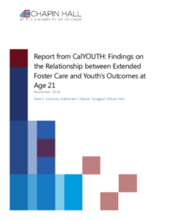This page contains documents and other resources related to children's care in the Americas. Browse resources by region, country, or category.
Displaying 231 - 240 of 552
This article examines family‐based interventions designed to increase parenting effectiveness, fathers' positive involvement, and couple relationship quality, all with the goal of enhancing children's development.
This paper reviews evidence from some well evaluated US reunification programs to investigate positive impact on post reunification outcomes such as preventing future maltreatment or future re-entry into care.
The aim of this study was to improve the mean time to initial foster care evaluation (TIE) from 32 to <7 days within 12 months for children in FC in Durham County, North Carolina.
The present report builds on prior research by examining outcomes from the third interview wave of the California Youth Transitions to Adulthood Study (CalYOUTH), which took place when study participants were 21 years old or older.
To illustrate design and implementation of the Strategies for Enhancing Early Developmental Success (SEEDS) Preschool Program, aimed at promoting school readiness in families connected to the child welfare system, the current paper uses parent- and teacher-reported data to summarize the progress of three participating families with diverse histories and presenting issues.
In the current study, the authors examined whether children with Child Protective Services (CPS) involvement who were in foster care had more advanced receptive vocabulary than children with CPS involvement who resided with their birth parents.
The purpose of this systematic review is to summarize the effects of interagency and cross-system collaboration aimed to improve child welfare-involved children and family outcomes related to safety, permanency, and well-being.
This exploratory focus group study examines foster parent perspectives on what facilitates and impedes their engagement in child welfare court processes.
This paper documents findings from an evaluation of the Live-In Family Enhancement (LIFE) program, and recommends that this approach be expanded for use in prevention as well as reunification.
This study evaluates whether the psychometric properties of the Pediatric Symptoms Checklist-17 (PSC-17), a common behavioral health measure typically used as a dichotomous screening tool for mental health needs, support its use as a continuous measure for tracking behavioral health over time.



